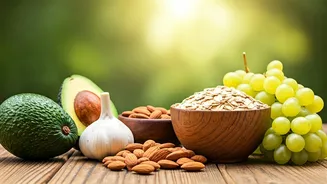Oats: Heart's Ally
Oats are well-known for their cholesterol-lowering properties, offering a simple and effective dietary addition. Packed with soluble fiber, specifically
beta-glucan, oats work by preventing cholesterol absorption in the bloodstream. This fiber binds to cholesterol in the digestive system, facilitating its removal from the body. Starting your day with a bowl of oatmeal is a delicious and beneficial habit. You can enhance your oats with fruits like berries or a sprinkle of nuts for added flavor and nutritional value. For optimal results, consume oats regularly, aiming for about 3 grams of soluble fiber daily. Remember, consistency is key when it comes to reaping the heart-healthy advantages of oats. Embrace this simple yet powerful dietary shift for better cholesterol management.
Beans: Fiber Powerhouse
Beans, a staple in many Indian households, are another excellent food for cholesterol reduction. Beans are rich in soluble fiber and protein, making them a filling and heart-healthy choice. Like oats, the soluble fiber in beans aids in decreasing cholesterol absorption. There are several varieties, including kidney beans, lentils, and chickpeas, which all provide unique benefits. Incorporate beans into your diet by adding them to soups, stews, or salads. You can also enjoy them as a side dish or in dips like hummus. Adding beans regularly helps you achieve your cholesterol goals. Aim to include at least half a cup of beans in your meals a few times a week. The versatility and nutritional richness of beans make them a vital component in any cholesterol-conscious diet.
Nuts: Healthy Fats
Nuts, particularly almonds, walnuts, and cashews, are packed with unsaturated fats and other heart-friendly nutrients, which can positively impact your cholesterol levels. These healthy fats help to lower LDL (bad) cholesterol while maintaining or even increasing HDL (good) cholesterol levels. The benefits go beyond cholesterol control; nuts provide essential vitamins, minerals, and antioxidants, contributing to overall health. It is recommended to have a handful of nuts daily as a snack or add them to your meals, such as salads or yogurt. However, it's essential to eat nuts in moderation due to their calorie density. Choosing raw or dry-roasted nuts instead of those with added salt or sugar will maximize health advantages and improve your diet.
Fatty Fish: Omega-3 Boost
Fatty fish, such as salmon, mackerel, and sardines, are excellent sources of omega-3 fatty acids, which are beneficial for heart health. Omega-3s help to lower triglycerides, which are another type of fat in your blood that can raise the risk of heart disease. Furthermore, fatty fish also reduces inflammation throughout the body. Aim to eat at least two servings of fatty fish per week. Consider grilled, baked, or steamed fish for the most health advantages, steering clear of frying, which can add unhealthy fats. Preparing fish with spices and herbs can create a flavorful and healthy meal. If consuming fish is difficult, consider taking a fish oil supplement as an alternative, but seek advice from your doctor.
Vegetable Oils: Smart Choice
Replacing saturated fats in your diet with unsaturated fats found in vegetable oils can significantly improve your cholesterol levels. Olive oil, canola oil, and sunflower oil are great choices, as they are rich in monounsaturated and polyunsaturated fats. These oils aid in lowering LDL cholesterol. Use these oils when cooking, baking, or as a dressing for salads. Remember to measure the oil, as all fats are high in calories. Avoid cooking oils high in saturated fats like palm oil or coconut oil, if possible. Switching to vegetable oils is a simple dietary change, providing significant heart-healthy benefits. Making this small adjustment can contribute significantly to managing your cholesterol and improving overall heart health over time.












